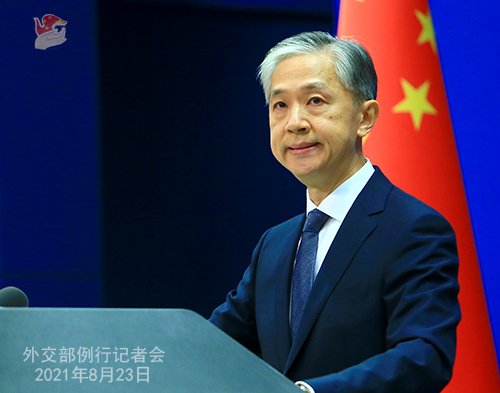Alwaght- China on Tuesday rebuked chaotic withdrawal from Afghanistan as an example of Washington's "selfish" foreign policy, hitting back at US Vice President Kamala Harris's remarks on Beijing’s actions in the South China Sea.
As the much-criticized and chaotic US withdrawal from Afghanistan is proceeding, Harris on Tuesday sought to reassure regional countries of America's commitment to Asia.
“We know that Beijing continues to coerce, to intimidate and to make claims to the vast majority of South China Sea,” Harris said in a speech during a trip to Singapore, claiming that Beijing’s actions “continue to undermine the rules based order and threaten the sovereignty of nations.”
“The United States stands with our allies and partners in the face of these threats,” she added.
The South China Sea is a gateway to major sea routes, through which about 3.4 trillion dollars’ worth of trade passes each year. China claims sovereignty over much of the strategic waterway and has since 2014 built artificial islands on reefs and installed military bases on them.
Vietnam, Taiwan, the Philippines, Malaysia, and Brunei have overlapping claims with China to parts of the sea.
China's Foreign Ministry spokesman Wang Wenbin hit back at Harris, saying Washington is hiding behind rhetoric of a rules-based global order to defend its own "bullying, hegemonic behavior."
The United States, which sides with Beijing’s rivals in the maritime dispute, routinely sends warships and warplanes to the South China Sea to assert what it calls its right to freedom of navigation, ratcheting up tensions among the regional countries.
China has constantly warned the US against its military activities in the sea, saying that potential close military encounters between the air and naval forces of the two countries in the region could trigger accidents.
"The current events in Afghanistan clearly tell us what the rules and order the US speaks of are," Wang said at a regular news briefing on Tuesday, adding, "The US can wantonly conduct military intervention in a sovereign country and does not need to be responsible for the suffering of the people in that country.”
After US President Joe Biden ordered a hasty withdrawal of American forces by September 1 to end a 20-year war, the Taliban militants intensified their offensive and rapidly overran major cities.
The Taliban took control of Afghanistan on August 15.
The situation has triggered large crowds of Afghan civilians and foreign nationals thronging the Kabul airport, with the US drawing widespread criticism for its ill-organized military pullout and haphazard evacuation scheme, which has already resulted in about two dozen deaths.
Wang noted that the US “can arbitrarily smear, suppress, coerce and bully other countries without paying any price" in order to defend the “America first” policy.
"This is the order the US wants... but who will believe them now?" he added.
The United States’ relations with China grew increasingly tense under former president Donald Trump. Washington has clashed with Beijing over trade, the South China Sea, Taiwan, Hong Kong, and the coronavirus pandemic.
Later, President Joe Biden kept up Trump’s tough approach towards China, saying that the US would continue to confront China's "attack on human rights, intellectual property and global governance."
Beijing has rejected those charges.



























